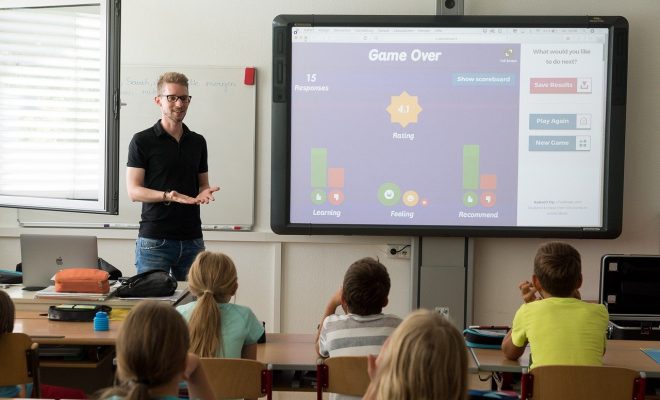Pass or Fail: Multi-Age Classroom Success Stories

In this multi-part series, I provide a dissection of the phenomenon of retention and social promotion. Also, I describe the many different methods that would improve student instruction in classrooms and eliminate the need for retention and social promotion if combined effectively.
While reading this series, periodically ask yourself this question: Why are educators, parents and the American public complicit in a practice that does demonstrable harm to children and the competitive future of the country?
Should kids be assigned classrooms based on age, or development?
The multi-age classroom and education philosophy are supported by research as an effective approach to education. Historically, multi-age education philosophies have also been proven to be useful all over the world. Though Mason and Burns have suggested that the instruction in multi-age classes is less effective, since these classrooms usually have higher achievers and more experienced teachers, masking negative aspects through a selection bias, other research contends there is no difference or that multi-age classes are a significant improvement.
Although multi-age programs, according to various research efforts, appear to involve certain difficulties with implementation in school and classrooms, it is clear that the benefits outweigh the costs when there is adequate awareness and application of reflective research and best-practice initiatives.
The international models of multi-age programs point to various advantages. Multi-age classrooms are popular in numerous countries. In 1995, for instance, around the point at which such classrooms were becoming well regarded, more than half of the classrooms in the Netherlands, Finland, Portugal, and Western Australia had multi-age groupings, and an estimated one in seven Canadian classrooms was multi-age.
Because of the educational success of multi-age classrooms, in 2004 the Netherlands Antilles federal government established requirements that all schools change from traditionally graded systems to a child-centered and mixed-aged approach.
The Australian Association of Multi-age Education was created in 1994 to support and lead multi-age schools in Australia. The goal of the organization is to provide professional development activities and tools, including access to relevant newsletters, journals, and workshops. The organization also holds biannual conferences to pool resources and information.
Multi-age groupings in Canada occur quite regularly in childcare centers and preschools, many of them operating independently of direct government involvement. The rules regarding implementation and management of multi-age programs were rolled out gradually and were designed to create best practices for centers and schools using the model.
Certain educational philosophies make use of multi-age classrooms, including the Montessori model and the Reggio teaching philosophy for preschool and primary education. In both philosophies, self-guided curriculum is also a crucial element, best integrated within the multi-age environment.
The success of the multi-age system is also fairly well documented. Professor Pavan, for instance, undertook a review of sixty-four studies on non-graded (multi-age) schools, concluding that 58 percent of students in those environments performed better than their peers on measures of academic achievement. Approximately 33 percent of the tested students performed as well as their peers in multi-age classrooms and only 9 percent of the tested students performed less well in a multi-age environment compared to a graded environment.
The same study found that students in multi-age settings were more likely to have positive self-concepts, high self-esteem, and positive attitudes toward school. It noted that the benefits to students, including academic benefits, tended to increase the longer the student was maintained in a non-graded setting. Those students called “underachieving” in the graded classroom were also, according to Parvan’s study, found to benefit from the multi-age classroom. Students in the multi-age classroom did better in assessments the more they were exposed to the multi-age environment.
Another study, in Columbia, Missouri, targeted public schools using computer technology as a tool for supporting school reform and creating multi-age classrooms in what had been a graded, single-age classroom environment. The results of the study, which targeted students in kindergarten through third grade, showed that the technology did help to establish multi-age classrooms successfully. The study’s results also confirmed that practical assistance and continuous support were key to the success of the multi-age classrooms. The schools appeared to show high improvement within a year in areas such as curriculum appropriateness.
A common concern among parents is that older children in multi-age settings receive less significant and fewer benefits than younger children. However, research has consistently shown that when older students are involved in teaching knowledge and skills to younger students, there are substantial benefits to academic performance and even IQ scores. Arthur Whimbey, for instance, in a Talking About Problem Solving (TAPS) study, found that students who are regularly allowed to “teach” another student show improvement in IQ assessment scores by as much as eighteen points.
It is worth considering the basic assumptions of the multi-age classroom when it is implemented in accordance with its guiding educational philosophy of child-centered learning. The assumptions detailed by Aina include:
(1) children learn as a total person
(2) children go through similar stages of development but experience stages differently
(3) the way children feel about themselves and their sense of competence in learning impacts their learning
(4) the best way for children to learn is through interaction with the environment and with people
(5) children learn best when they are taught via integrated curriculum that allows for pattern-building and access to sensory data
(6) children should not be given knowledge but allowed to construct it themselves
(7) the process of learning depends on social interaction
(8) children learn the skills of communication and expression through sharing their learning with others
(9) children learn math skills and processes best when allowed to explore, discover, and solve real mathematics problems
(10) children learn best in a classroom environment that is organized but flexible and imbued with developmentally appropriate tasks.
In other words, child-centered learning is just what it claims to be: the child is the focus of the education effort and is allowed to create the lead focus of curriculum and teaching strategies. The assumptions also emphasize an important developmental point, which is that every student develops differently. While developmental phases are similar for each of us, we experience each phase differently and are affected by developmental phases in different ways. Education systems have to allow for this if they are to effectively support what Aina describes as “total person” learning.
So how do we translate these obvious positive outcomes to today’s age-segmented classrooms?






